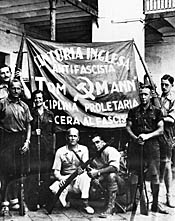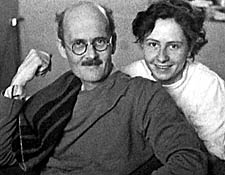Revolutionary who trained Dad’s Army
Tom Wintringham pioneered the International Brigades in the
Spanish Civil War and went on to train the Home Guard in guerrilla
warfare writes Dan Carrier
The Last English Revolutionary, Tom Wintringham 1898-1949
by Hugh Purcell. Sutton Publishing, £20.

The Tom Mann centuria. Tom Wintringham is crouching centre
left

Tom recovering in London with Kitty in 1938
THE Spanish dawn came as
quickly as a theatre curtain opens,” wrote Tom Wintringham to his
mother from a field dressing station in Spain during the country’s
civil war. Also see:
Tom Wintringham ex Wiki
He was speaking of the morning in Jarama, a valley to the east of
Madrid – and writing with a bullet in his leg, with no painkillers
and little hope of seeing a doctor in the foreseeable future.
But rather than display the silent charms of the Spanish
countryside, the sunrise brought a scene of military devastation.
Wintringham’s comrades had been fighting to gain control of a
hilltop, a campaign he took charge of after the commanding officer
was shot, and had such poor odds of success that it became known as
Suicide Hill to the British International Brigade.
This was Wintringham as a soldier. He had gone to Spain to confront
fascism. But the communist activist, whose life is chronicled in an
informative biography by Hugh Purcell, was, as the daybreak phrase
suggests and as those who believe in a socialist utopia often are, a
romantic at heart rather than a fighter.
Purcell’s biography uses Wintringham’s life to tell the story of the
evolution of left-wing politics during its most telling phase – the
1930s – and is also about how a founder member of the Communist
Party of Great Britain eventually fell out of love with the
political philosophy he dedicated his life to.
The name Wintringham holds romantic connotations for the British
Left, particularly Camden left-wingers of the 1920s, 30s and 40s, in
whose circles he moved.
He settled in King Henry’s Road, Primrose Hill, on his return from
Spain and became known locally for his hospitable nature – and it
was from King Henry’s Road he established a new, albeit short-lived,
political party – the Common Wealth.
And from his Primrose Hill base came the work that made him a
household name: he wrote articles for the Picture Post, poetry,
books, pamphlets and articles for the Daily Worker.
Spain cemented his reputation – and laid the foundations for his
work with the Home Guard during World War II, which gave his
military expertise respectability.
This is uncovered by Purcell’s research, which was helped by a
remarkable archive. As Purcell explains, he had been watching Ken
Loach’s Spanish Civil War epic Land and Freedom with Wintringham’s
daughter Lesley. The opening scene shows the granddaughter of a
veteran sorting through his possessions – and Purcell was told of
similar suitcases kept in the home of Wintringham’s elder son in
Brussels.
They were full of files, letters and pictures – a biographers dream,
and, when combined with his public records and published works, has
allowed Purcell to create a complete picture of his subject.
Wintringham’s life was complicated: he was not just a mirror of
changing political perceptions, as the reality of Stalin’s version
of communism undermined his loyalty to the Comintern, but his
private life too. Such was his popularity, when he was recovering
from the wound in 1938, four women who all called themselves Mrs
Wintringham appeared at his bedside.
He was married twice, and managed to keep on good terms with his
lovers – two of which who were so in love with him they insisted on
taking his name, without nuptials.
Much of his time in Spain is covered in the book he wrote about his
experience, The English Captain, which covers the battle of Jarama.
But he leaves out the story of how he met and fell in love with
Kitty – so it is down to Purcell to piece together the story.
Kitty, an American journalist, wrote about meeting Tom in Barcelona.
She wrote: “At Café Rambla, I eyed the group at a corner table. I
saw a moving forest of knees. Only the English could produce
anything so incredibly tall and fresh as those boys. Blankly and
coldly they looked at me as only the English can. Then a soft voiced
bald man touched my arm: ‘You must join us.’ Relaxing gradually I
realised I was talking to a gifted conversationalist, cultured,
intelligent, witty.
“That’s Tom Wintringham, I was told. “He’s a big shot in the English
Communist Party, but he’s an old sweetie.”
The meeting between Tom and Kitty is not a just a good example of
the mores of a passionate man – Purcell explains how it played an
important role in his disillusionment with the Communist Party.
It was not only the betrayal of the Spanish workers by the
anti-revolutionary Comintern that made Tom re-think his loyalties.
When Kitty was labelled a Trotskyite spy, and therefore
Wintringham’s own credentials were called in to question, he
realised he could no longer tow [ sic ] the party line.
His war record between 1939 and 1945 was impressive: unfit for
active service he decided to lend his military expertise to the
creation of the Home Guard.
He saw the Guard as a bulwark against a Nazi invasion – or, more
sinisterly, a fascist coup led by the British ruling classes who
Wintringham did not trust. He believed they were capable of striking
a deal with Hitler as they were more scared of Soviet Russia than
the Third Reich. [ Were they wrong? - Editor ]
Wintringham set up a school to teach the tricks of guerrilla warfare
– he wanted to change the idea of the Home Guard of being an elderly
milkman armed with a broomstick: he wanted an armed citizenry.
This linked in with a career of writing articles in publications
like Picture Post, The Daily Mirror, the New Statesman and Tribune
on such topics as how to make bombs and plan ambushes.
Above all, Purcell’s work is an enjoyable tale of the life of one of
the heroes of the British left: his story is worth telling because
as an individual he was interesting – and it works as an insightful
appraisal of the politics of the mid-20th century.
The Last English Revolutionary: Tom Wintringham 1898 1949
by Hugh Purcell. Sutton Publishing
and
New Ways of War by
Tom Wintringham which is NOT available
from Amazon. Governments do NOT like democracy.
The Wiki gives him a decent write up.